Board in the Library, Part Six: Board Game Night Basics
We are pleased to publish this article, the last in a six-part series on board game programming in public libraries, from John Pappas, the Branch Manager at the Bensalem Branch of the Bucks County Free Library System. (Read Part One | Part Two | Part Three | Part Four | Part Five | Part Six). See also webinars with John on boardgames: The Golden Age of Gaming: Board Games for Grown-ups and Whose Turn Is It, Anyway? Online Board Gaming and Libraries.
Board Game Night Basics
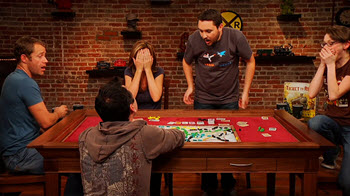 We've spent plenty of time during this series discussing board games in general but very little on how to specifically host a successful board game night. Which is what most of you are probably going to do! Right? Play games with other humanoids. So how do you do that?
We've spent plenty of time during this series discussing board games in general but very little on how to specifically host a successful board game night. Which is what most of you are probably going to do! Right? Play games with other humanoids. So how do you do that?
Simply reducing the many social, emotional, and intellectual facets of gaming into putting out a couple of games (even the wonderful ones recommended in this series) and calling it a game night is like placing a pile of pictures books and calling it a storytime. There is so much more fun involved!
A good game night host needs to encourage new players, keep experienced gamers engaged and, above all, ensure that everyone has a good time playing. Libraries love hosting community events and there is, arguably, no community more fervent than the gamer community when it comes to commitment to a store or venue. I travel an hour weekly to get to my board gaming group because I like the people and they put up with me.
The act of getting together to engage in participatory play is what draws gamers together and the environment can help in that. Additionally, the library provides a safe and welcoming place for people to attempt new hobbies and meet new people. Bars can be loud and off-putting. Personal residences can be intimidating. Thus, libraries seem a natural place to host board gaming events for people just exploring the hobby.
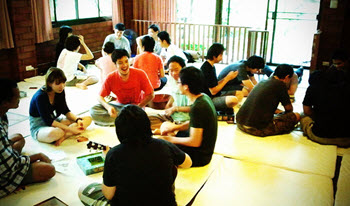 You may already host gaming event for teens and young adults and it is only a small leap into hosting quality, fun and engaging gaming events for adults, families, and seniors. Take my word for it, nothing raises eyebrows more than a library common area or meeting room full of people sitting or standing around tables, cheering, groaning and laughing over a sheet of cardboard and a bunch of shiny polyhedral dice.
You may already host gaming event for teens and young adults and it is only a small leap into hosting quality, fun and engaging gaming events for adults, families, and seniors. Take my word for it, nothing raises eyebrows more than a library common area or meeting room full of people sitting or standing around tables, cheering, groaning and laughing over a sheet of cardboard and a bunch of shiny polyhedral dice.
However, while this can be a rewarding event for libraries and the community, it does require planning and attention on the part of the librarian hosts for it to get off of it’s feet. I've been fortunate enough to plan, host, and moderate games at a few different library systems and I thought it would be helpful, as the final chapter of this series, to list some of the things I do that seem to make these events a success. Mileage may vary and depending on your community some of these recommendations may not stick. But it is a good place to start.
Here is a quick summary for those in a rush to get out of here and starting their own group!
Stick to 8-12 attendees
Promote and communicate on Meetup and local Facebook groups.
Feature and teach one game per event.
Provide a variety of games with a diversity of themes/mechanics.
Moderate, don't play.
How many people should attend?
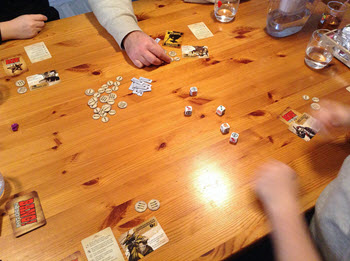 For me the sweet spot in any gaming group is between 8 and 12 attendees. Of course, you are going to be limited by how much space you can provide, how many moderators (staff or volunteer) you can muster, the experience of your group, and the expectations of your library. With a large group of emerging gamers just now entering the hobby, more attention needs to be paid to teaching, explaining, and learning about modern board games. Meanwhile, a group of experienced gamers will be able to blaze their own trail into the event. To help work this out I communicate with potential attendees through Meetup and have three questions when they RSVP to a game night.
For me the sweet spot in any gaming group is between 8 and 12 attendees. Of course, you are going to be limited by how much space you can provide, how many moderators (staff or volunteer) you can muster, the experience of your group, and the expectations of your library. With a large group of emerging gamers just now entering the hobby, more attention needs to be paid to teaching, explaining, and learning about modern board games. Meanwhile, a group of experienced gamers will be able to blaze their own trail into the event. To help work this out I communicate with potential attendees through Meetup and have three questions when they RSVP to a game night.
What are your favorite board games?
What games would you like to learn?
Would you be willing to help teach the featured game (or bring your own to teach?)
This helps me determine the experience level of the group. If everyone attending has an understanding of modern board games (usually by their listing modern board games as their favorite) I can pretty much supply the games, set a few tables up to get them started, and then watch the fun. If they list Monopoly, Bridge, or other classic games as their favorite then I may plan on being more engaged and maybe teach a few rounds of the game and try to enlist the help of one of my more experienced players to move the night along. Also for inexperienced attendees, I may limit the size of the group to 4-8 to start with and grow from there. Either way it is important to listen to the attendees as they RSVP, comment, and discuss on the event listing.
However, that being said, modern board games are becoming increasingly popular and available in big box stores like Target and Barnes & Noble so these days I generally assume some level of knowledge from my attendees. What I used to only see in hobby board game stores two years ago are now common fare at large chain bookstores (as they try to remain relevant) and big box stores.
How do I promote my event?
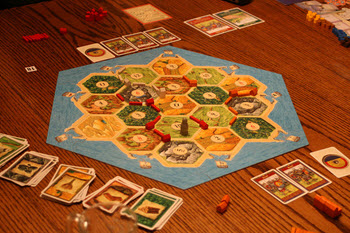 Like most librarians, I plan my events in advance and promote them as thoroughly as I can. The most important thing I can impart is that it helps to use a promotional engine that encourages both communication and engagement as your primary outlet. The gaming community is just that -- a community. So, in addition to the standard library promotion of the online calendar, flyers and quarter-sheets, I’ve found two venues to be particularly useful. Neither of these two venues are going to be a surprise -- Facebook and Meetup.
Like most librarians, I plan my events in advance and promote them as thoroughly as I can. The most important thing I can impart is that it helps to use a promotional engine that encourages both communication and engagement as your primary outlet. The gaming community is just that -- a community. So, in addition to the standard library promotion of the online calendar, flyers and quarter-sheets, I’ve found two venues to be particularly useful. Neither of these two venues are going to be a surprise -- Facebook and Meetup.
While I promote my events through our Facebook account, I mostly use it as a preliminary gauge of community interest. For example, for the Collingswood Library I’ve started a monthly "Board Games for Grown-Ups" group and two local Facebook groups were very helpful in determining if the interest was there (it was) as well as what sort of gaming event would be best received. With over 60 responses to my question as to whether or not a board gaming group would be worth starting, I learned a great amount about the local gaming scene, the gaming interests (and experience) of the community and the relative age of attendees. All of which will help me in molding an event appropriate for the community.
The next step is Meetup. Meetup is a social networking site which allows groups of people with similar interests to connect online in order to facilitate physical meetings. With a paid account, you can create public or private events and Meetup will push it to people with similar interests in your area. This works well for me in two ways. First, it grabs the attention of people newly moved into the area who are interested in gaming, board games, or card games. Secondly, it engages people already in the community that may be interested in what your group has to offer.
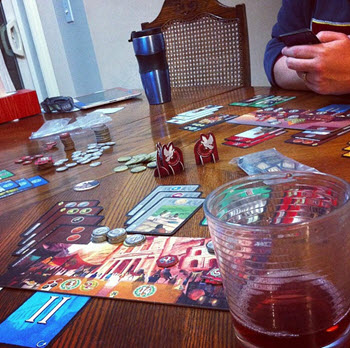 Results do vary though. What took me months to nurture in one area took days in another. To use the example of Collingswood again, within a week of posting my meetup group, I had 60 active members and 30 people signed up for the first event. Meanwhile it took me months to generate the same amount of interest at the Bensalem Library and it took a year to get the same results at Upper Darby. In the end, each location has a strong, consistent and dedicated group. It just took different amounts of time to get there. Although it's possible I may just be getting better at this whole gaming thing.
Results do vary though. What took me months to nurture in one area took days in another. To use the example of Collingswood again, within a week of posting my meetup group, I had 60 active members and 30 people signed up for the first event. Meanwhile it took me months to generate the same amount of interest at the Bensalem Library and it took a year to get the same results at Upper Darby. In the end, each location has a strong, consistent and dedicated group. It just took different amounts of time to get there. Although it's possible I may just be getting better at this whole gaming thing.
If you are lucky, and we are all lucky sometimes, there may possibly already be a board game meetup in your area. Reach out to them and ask if you could promote your gaming event on their page. Most of the work is already done if the group has 100+ members and several administrators. If not, you may have to shell out the fees for a 3 month subscription.
One last thing before we move on to the next tip. Meetup really excels at fostering online communication and conversation as well as physical meetings. Once an event is posted on my Meetup page, people begin talking and discussing the games. Once the event is passed, they post pictures and discuss the games played. And best of all, many participants begin to develop ownership of the group by organizing events, moderating conversations, and even becoming a driving force of the group. People want you to share their excitement for gaming and play.
What types of games should I provide?
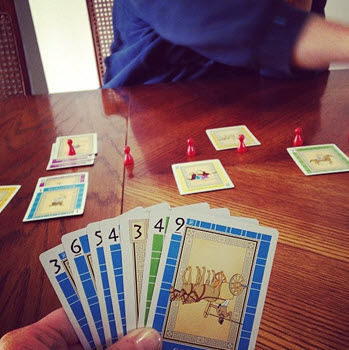 At the start of any board gaming event, the moderator should be able to provide a set-list of games the library provides. I have a brag book of "Alignment Sheets" which explain each game, provide the basic rundown of the game, and even "aligns" it so some core curriculum standards to boot. Take a moment to look through a few of them, you may discover a board game you really like.
At the start of any board gaming event, the moderator should be able to provide a set-list of games the library provides. I have a brag book of "Alignment Sheets" which explain each game, provide the basic rundown of the game, and even "aligns" it so some core curriculum standards to boot. Take a moment to look through a few of them, you may discover a board game you really like.
Providing a huge set-list of games may be difficult if the library has a limited collection of games. In which case a set-list could consists of classic games (Chess, Parcheesi, traditional Card Games), Mass Market Games (Clue, Monopoly, Sorry), and Word/Party Games (Scrabble, UpWords, Apple to Apples, Say Anything).
These could be paired along with one featured game already set-up in advance and available to teach. Talk to any FLGS (Friendly Local Game Stores) to see if they have any demo games you could use or if they would be willing to help partner with you. The most important part is that people are playing and the night has a good flow to it. Once you have a few nights under your belt, you can have previously featured and taught games available for play as well.
At this point, my gaming group at the Upper Darby Public Library is practically on maintenance with every weekly event listed as an "Open Gaming Night" and attendees bringing in bags of games to play. They teach what they want. They play what they want, and they welcome new people as they arrive. It is a glorious sight to behold. But we didn't get there overnight. It took a year of featuring games, attracting people to the game nights, and fostering a dedicated and talented crew of volunteer gaming advocates to take the reins.
Scaffolding is helpful in determining which games are provided at an event. The first event may be mostly classic or mass market games which everyone has a previous cultural understanding of. The next event may include some simple modern board or card games (Sushi Go! Pandemic, Ticket to Ride). For the third event I will teach a new game but have Ticket to Ride (the game taught at the last event) set up at a table for people to pick up and play. Four or five events into a season and most of your regular attendees will be able to determine which games they enjoy and which ones they feel comfortable teaching to new players.
Should set up one game and teach it or go free range?
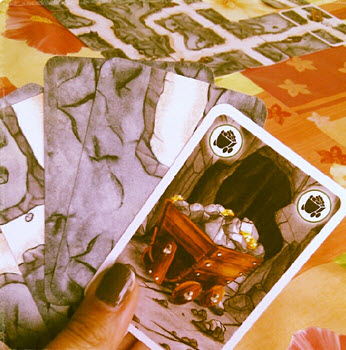 I usually prefer to set up one featured game ahead of time so that as soon as enough people arrive, I can get them started on playing by teaching the game.
I usually prefer to set up one featured game ahead of time so that as soon as enough people arrive, I can get them started on playing by teaching the game.
Another option is to have a classic or previously taught game ready to go. Either way, be more welcoming and encouraging to people as they come in for the first time. In many ways gaming nights can look like a middle school dance with everyone sort of circling the tables and moving to the beat but no-one really willing to take the plunge into playing, teaching, or getting a group together. The moderator needs to be the one to pull everything together.
It may be best to keep it simple when you first start. If your group is familiar with certain games (word or party games, for example) then start with those. Be careful with party games though since they really work well off of extroverted party guests but can be intimidating for those introverts among us.
Hosting a poll on meetup would be a good way to gauge everyone's interests. Then you can start adding new games into the mix as you proceed with other events. Also, encourage people to bring in their own favorites, it takes some of the onus off of you to, allows you to have more tables going at once, and passes some of the ownership of the group to attendees.
If you want to start with a "gateway" game, I recommend (and there is nothing shocking here) Ticket to Ride as the perfect game to start with. Then move on to Dixit, Carcassonne, Alhambra, Small World, Dominion, and Pandemic. Avoid King of Tokyo at first (due to the player elimination) and Settlers of Catan (due to the negotiation) until the group has a few games under their belt. Unless someone wants to bring and teach those games.
If someone brings in their favorite game and wants to teach it to everyone? Let them!
We've had great gaming sessions with games that our attendees brought (and also a few duds
Should I actually play?
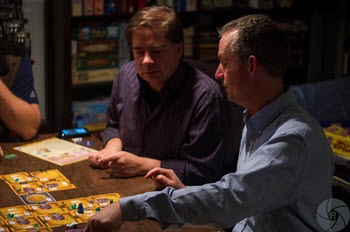 It is tough to both guide people through a game and play at the same time. So instead of being an active player it may serve the group better for you to moderate, teach, search rules, greet newcomers, and get people settled into games. Also remember that teaching a new game to attendees will take twice the amount of time that the game should last. Say you were teaching Power Grid (120 minutes normally = 240 minutes for the teaching game). So try to stick to teaching simple or quicker games that normally play in about 30-60 minutes.
It is tough to both guide people through a game and play at the same time. So instead of being an active player it may serve the group better for you to moderate, teach, search rules, greet newcomers, and get people settled into games. Also remember that teaching a new game to attendees will take twice the amount of time that the game should last. Say you were teaching Power Grid (120 minutes normally = 240 minutes for the teaching game). So try to stick to teaching simple or quicker games that normally play in about 30-60 minutes.
Know the game before you teach it.
At very least you should have read through the rules once or twice, watched a few rounds of play on YouTube (Tabletop or Starlit Citadel are my two go-to channels to see how a game is played) and set the game up on a table. Whatever you do, don't start a game blind. Nobody will walk away happy from that.
How large should the event be?
This depends on your space limitations but I find that 3-4 tables are usually enough. If people RSVP on Meetup then you should have a decent idea of how much space you will need to set up for the event. Each table will have a few games displayed.
If you can, try to have adequate seating for the number of people you are having. When we have our big nights, we try to have 2-3 tables setup. This allows for multiple games to take place. Now, this doesn't always happen. Normally, two tables will be pushed together to make one big gaming table for a large group game.
How long or complex should the games be?
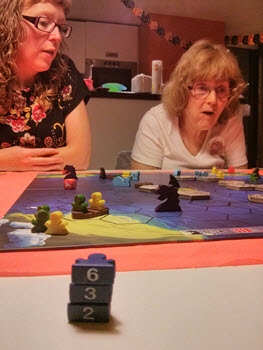 Your best resource to answer this question lies in the advanced search feature of Board Game Geek. You all are librarians! Have at it.
Your best resource to answer this question lies in the advanced search feature of Board Game Geek. You all are librarians! Have at it.
I generally searched with parameters set for Game Weight (1-3), a maximum playing time of 45 minutes, and a board game subdomain of "Family Game." This provides fun, relatively quick-to-play (less than an hour), and easy to learn games for new gamers.
7 Wonders, Dominion, Pandemic, Ticket to Ride, Coloretto, Hanabi, and Takenoko are all good starts. My personal recommendation is to pick up Machi Koro -- a simple, fun, city building game with a tad of dice rolling to boot. Also I really enjoy Las Vegas, a dice rolling area control game that comes out weekly at my events.
How many games should we play?
I see our game nights as a progressive arc.
We usually try to start with something light and easy. This "opener" would be your basic 10-30 minute filler game (especially if only a few people have arrived and you are still waiting for others). These could be dice games like Zombie Dice, card games like Love Letter or Sushi Go!, dexterity games like Click Clack Lumberjack, or deduction games like Coup. These games are easy to play and set-up, require very little emotional buy in from the players, and are a nice way for new players to get acquainted.
Then we move onto the more meaty games as more people show up. These are the games for 3-8 players that take 1-2 hours to play and generally include and are similar to the one I set up to teach. We will try to play one or two of these, depending on time.
We try to end the night with something light. If I include a player elimination game like King of Tokyo, this is where I do it.
If we have a large group, we break out One Night Ultimate Werewolf, The Resistance, Tsuro, Bang: The Dice Game, or Masquerade. This makes the night feel something like a movie: light at the beginning where everyone gets to know each other; a heavy plot build up in the middle where all the action takes place; and then your conclusion where someone dies.
What if someone doesn't play nice?
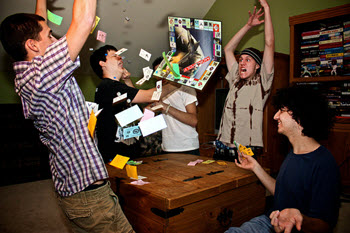 I suppose this one could be tricky. After developing, moderating, and hosting three different board game groups in libraries, I have only had to ask one individual to leave the group. Other than that, you may want to go through some possible steps to ensure everyone gets along and has a good time. You may want to outline some basic expectations towards the group. These could be your basic "Things I learned in kindergarten" variety of expectations.
I suppose this one could be tricky. After developing, moderating, and hosting three different board game groups in libraries, I have only had to ask one individual to leave the group. Other than that, you may want to go through some possible steps to ensure everyone gets along and has a good time. You may want to outline some basic expectations towards the group. These could be your basic "Things I learned in kindergarten" variety of expectations.
But, as with any group of individuals, there will be some disharmony eventually (despite the best posted signage). If an attendee is taking a game too seriously, being rude or disruptive to the other players, or generally creating an atmosphere that isn't fun, it is perfectly reasonable to have a subdued conversation about the type of gaming event you are running. Generally, attendees can read the type of environment you are creating (it can also be determined from the types of games you are providing). If it is an attendee's first time at the group, give them some time to adjust. It is possible that the style of play they are used too simply doesn't align with your group.
As your group grows larger, people will gravitate towards other people with similar habits of play and interests. If they are motivated to win, they will find more competitive players. If they are motivated towards thinking and strategy, they will find people who also prefer thinking and strategy.
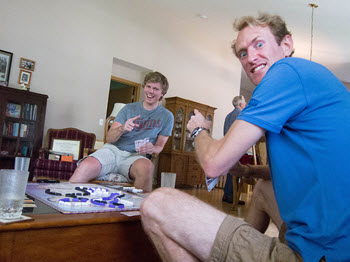 It is also likely that some players will not have their needs met by your group. Don't worry about it! Some people will show up once, some will show up monthly, and some will show up to every event and bring friends.
It is also likely that some players will not have their needs met by your group. Don't worry about it! Some people will show up once, some will show up monthly, and some will show up to every event and bring friends.
Advertise your expectations of the group as well. I explain that our groups are beginner-friendly, non-competitive, and casual. I also provide examples of what types of games we tend to play. A few questions you can ask yourself are:
Is your event family friendly? Or are you focusing on one specific age or demographic.
What style of game do you want to focus on? I recommend focusing on games you are familiar with and can teach. You can grow from there.
What is the motivation of your group? Do you want a social atmosphere? A competitive/tournament one? A learning one?
What types of games should we start with?
Such a difficult question! I recommend the following types of games to get your group started. Each one has been a hit at my groups and I found them all to be crowd-pleasers.
The Gateway Game
Ticket to Ride
7 Wonders
Carcassonne
The Cooperative Game
Pandemic
Flashpoint: Fire Rescue
Hanabi
The Filler Game
Las Vegas
Sushi Go!
Guillotine
The Two-Player Game
Jaipur
The Duke
Battlelines
The Mean Game
Saboteur
Survive: Escape from Atlantis
Bang: The Dice Game
The Screamer
Panic on Wall Street
Escape: Curse of the Temple
Pit
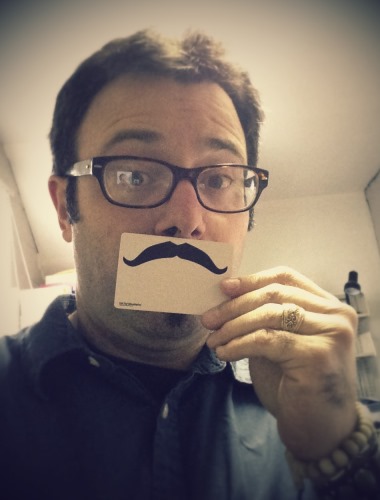 Game over, man!
Game over, man!
That is a wrap people! Game over, man!
We explored modern board games in the context of a library setting and it was a blast. If you ever want advice on starting a game group, selecting and cataloging a board game collection, or just want to know what I am playing, you can find me on Twitter.
John Pappas is the Branch Manager at the Bensalem Branch of the Bucks County Free Library System. He enjoys talking about emerging technologies, gaming, public librarianship, outreach, and zen.
